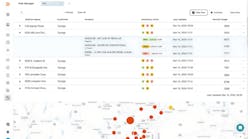Demand in Mexico for plastics grew dramatically in recent years, and that was good news for many of the country's tank truck carriers. Beneficiaries included Transtolvas SA de CV in Monterrey, Nuevo Leon.
Established in 1987, the dry bulk hauler carved out a profitable niche by providing customized plastics transportation service to the automotive manufacturing industry. The automotive sector alone accounts for 5% of the total plastics market in Mexico. Plastics production in Mexico grew by close to 50% over the past five years just to keep up with rising demand.
“Our business has grown steadily with the automotive sector, as well as the other industries we serve as a plastics transporter,” says Fernando de la Pena, Transtolvas chief executive officer. “We have benefited from being one of the first plastics haulers in Mexico to earn ISO 9001 quality certification. We did that six years ago. We've also benefited from running state-of-the-art plastics hauling equipment.
“We believe Transtolvas has the opportunity to become one of the principle plastics haulers in Mexico. We doubled our capacity over the past year, and we're working hard to keep up with the plastics industry growth rate.”
Reasons for optimism
De la Pena offers plenty of reasons for his optimism. One reason is that trucks handle the overwhelming majority of plastics shipments in Mexico. The railroads play a relatively small role, in part because rail hopper cars remain in short supply, de la Pena says.
Most importantly, plastics are being used in an increasingly wide range of products in Mexico. For instance, the construction industry is using plastics as a substitute for steel and other materials in doors and windows. Polyethylene Terephthalate (PET) has become much more popular as a substitute for glass in beverage packaging.
Petroleos Mexicanos (PEMEX), the main producer of plastic resins in Mexico, projects that domestic production capacity is nearing 300,000 metric tonnes (330,690 US tons) per year of primarily polypropylene. Another big producer in Mexico — and a Transtolvas customer — Indelpro plans to double its capacity in 2008. Mexico imports another 638,000 metric tonnes (703,274 US tons) just to meet total domestic demand.
The goal at Transtolvas is to expand its customer base to gain a bigger share of the plastics transportation market. “We've made good progress hauling plastics for the automotive industry in Mexico,” says Javier Saenz, Transtolvas general manager. “We're looking at a variety of expansion opportunities that would make it possible to diversify into other plastics sectors. Our customers are big, mid-, and small-sized product manufacturers. We believe that customers who will view us as a partner and have a need for customized services and personalized services would be the best fit for us.”
Saenz adds that Transtolvas also wants to diversify its cargo variety. Plastics currently dominate the operation, but the carrier handles flour, salt, soda ash, and sand.
“We would like to do more in the food sector, but it is a market that still hasn't fully embraced bulk shipments of flour, corn meal, sugar, and other products,” he says. “Many bakeries lack silos, which are very expensive to build. Most still receive flour and other food products in bags.
“In many cases, we're still helping customers in Mexico to recognize the benefits of bulk shipments. We work closely with them to help with the transition from bags to bulk. We give our customers a lot of personal attention, and we focus on the details of their operations. We are a family company, and customers know they can contact us anytime they have questions about bulk shipments.”
Operating area
Transtolvas serves customers in an operating area that extends south to Mexico City; north to Nuevo Laredo, Tamaulipas; and west to Hermosillo, Sonora. Forty percent of the carrier's business is in the Monterrey-Saltillo area. Average trip length for the Transtolvas fleet is 620 miles, and backhauls are very limited.
Transtolvas has assembled a diverse fleet that is capable of handling virtually any dry bulk transport requirement. The fleet includes 33 tractors and 72 trailers. Many of the trailers are pulled in doubles trains that have a maximum gross combination weight of approximately 166,000 pounds in Mexico.
Most of the tractors are Kenworth T800 conventionals, but the carrier has run a few Volvos. Transtolvas added five new tractors this year for both replacement and expansion. Tractors average 100,000 miles a year.
All of the tractors are specified with sleeper cabs. The drivetrain includes Cummins ISX engines rated at 400 horsepower, 18-speed Eaton Fuller transmissions, and Meritor drive tandems with a 4.10 ratio. For product handling, the fleet runs mostly Gardner Denver blowers.
Satellite tracking
About 75% of the tractors in the fleet were outfitted with satellite tracking and communications systems. “We're using the satellite system for a couple of reasons,” Saenz says. “First, our automotive industry customers want precise information on the location of vehicles en route to their plants. Next is security. Satellite tracking helps protect against theft.”
Saenz adds that Transtolvas doesn't send its tractor-trailer rigs out on set routes. Satellite tracking gives the carrier the ability to know the location of vehicles no matter where they are going.
Transtolvas also is studying the benefits of trailer tracking systems. “We believe this could give us a big marketing advantage with our customers, but it is expensive and there are details to be solved, such as a power source that does not rely on the tractor when the trailer is disconnected,” Saenz says. “Each unit costs around $700, and we would have to spend roughly $28,000 for our entire fleet of trailers. We also would have to pay a monthly service fee.”
Bulk trailers
The carrier runs a variety of dry bulk trailers, many of them constructed of carbon steel. Some are lined with an epoxy material to protect against cargo contamination. Over the past couple of years, Transtolvas has added a number of Heil SuperFlo units with capacities of 2,040 and 1700 cubic feet.
“We believe the SuperFlo trailers give us a competitive edge because the aluminum construction results in a lighter tare weight, which means we can haul larger payloads,” Saenz says. “Between October 2006 and July 2007, we added 11 new SuperFlo Trailers, and we're looking at additional purchases for 2008.
“We're very comfortable with the Heil product. We pay a premium price, but we believe it is worth it. They have adjusted their designs to fit our needs, and they are building the SuperFlo trailers to meet Mexico's operating conditions.
“Heil gives us very good service support. In fact, all our drivers received specific operator training by Heil. They sent people to Monterrey in 2006 to conduct this training program and show our drivers best practices on the Superflo trailers. It was very beneficial.”
The newest SuperFlo trailers in the fleet are pneumatic self-loaders. Hardware includes Knappco domelids and Sure Seal swing-away tees. The newest trailers were specified with the Haldex roll stability system. They also have Michelin tires, Alcoa aluminum disc wheels, and Hendrickson's Intraax air suspension with the Tiremaax tire inflation system.
Transloading site
In addition to the trucking capability, Transtolvas also operates a transloading site in Monterrey under the Ferrotolvas name. The facility occupies four hectares (10 acres) and has 45 car spots. Currently, 50-60 trailerloads move through the transload site each week.
“About half of our customers are using our transloading services now,” Saenz says. “Some of our customers also have their own rail sidings, and we provide service from those locations. We believe there is a good future in transloading in this area, and we see excellent growth potential.
“We're transloading plastics, flour, and salt right now, and we're looking for additional products. We want to double the railcar capacity and pave the yard. We just do transloading right now, but we want to add bagging capabilities. We also want to add warehousing.
“We believe we could fit up to two warehouses on the Ferrotolvas site. They would provide a dust-free area to handle a wider range of foods and other specialized products.”
The Ferrotolvas facility is served by the KCS/TFM railroad. Developing the transloading site took quite a bit of work. Construction workers started by putting down a thick rock base. That was followed by many yards of compacted soil to provide a level surface for the track.
Services at the site include a scale. For product transfer, the company uses two portable conveyors or the pneumatic self-loading dry bulkers in the Transtolvas fleet. Railcar inventories are tracked by computer and posted online.
Wash rack
Many of the products handled through the transloading site and by the Transtolvas fleet require trailers that are cleaned after every load. The carrier has a single-bay wash rack at its Monterrey terminal. Bulkers are washed by hand inside and out. Afterwards, they are dried by a natural gas-fired dryer that was built in house.
Total employment at Transtolvas is approximately 50 workers. Another 10 workers are employed at Ferrotolvas. De la Pena says the company has had little difficulty finding drivers or other workers.
“We stress loyalty in this company,” he says. “We've kept people working even during the worst financial times in Mexico, and we expect the same loyalty from our employees. As a result, we have a lot of experienced drivers, some of whom have been with us close to 25 years. Our drivers take a lot of personal responsibility for providing our customers with outstanding service.”
Outstanding performance and a wide range of dry bulk transportation services have made Transtolvas the success that it is today.








